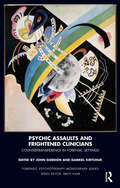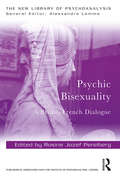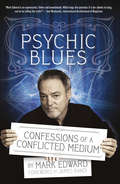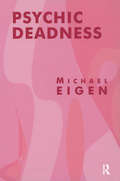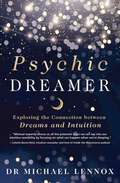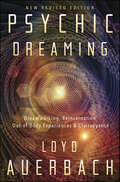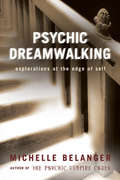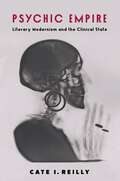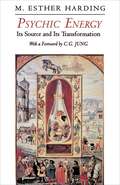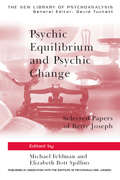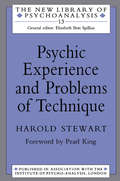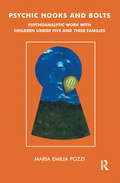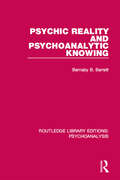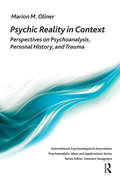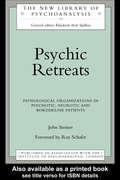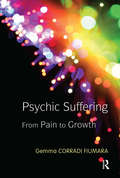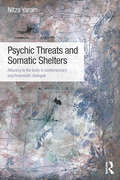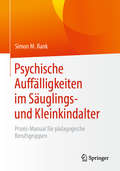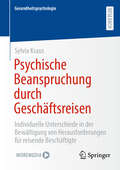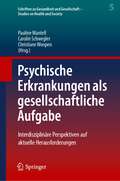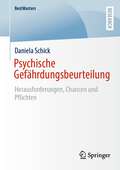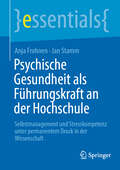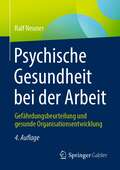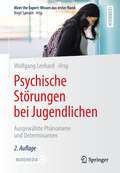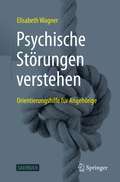- Table View
- List View
Psychic Assaults and Frightened Clinicians: Countertransference in Forensic Settings (The Forensic Psychotherapy Monograph Series)
by John Gordon R. D. Hinshelwood Gabriel Kirtchuk'...a fascinating read for mental health workers regardless of their own theoretical background. Working with disturbed and disturbing individuals in secure settings produces strong feelings, and working with those feelings is undoubtedly an essential part of providing care effectively. This book is likely to challenge readers' understandings of their own actions and reactions.' (Dr Neil Brimblecombe, Director of Mental Health Nursing, Department of Health, and Nurse Director, Tavistock and Portman NHS Trust.)
Psychic Bisexuality: A British-French Dialogue (The New Library of Psychoanalysis)
by Rosine Jozef PerelbergWinner of the American Board & Academy of Psychoanalysis Edited Book Prize for 2019! <P><P>Psychic Bisexuality: A British-French Dialogue clarifies and develops the Freudian conception according to which sexual identity is not reduced to the anatomical difference between the sexes, but is constructed as a psychic bisexuality that is inherent to all human beings. <P><P>The book takes the Freudian project into new grounds of clinical practice and theoretical formulations and contributes to a profound psychoanalytic understanding of sexuality. The object of pychoanalysis is psychosexuality, which is not, in the final analysis, determined by having a male or a female body, but by the unconscious phantasies that are reached après coup through tracing the nuanced interplay of identifications as they are projected, enacted and experienced in the transference and the countertransference in the analytic encounter. <P><P>Drawing on British and French Freudian and post-Freudian traditions, the book explores questions of love, transference and countertransference, sexual identity and gender to set out the latest clinical understanding of bisexuality, and includes chapters from influential French analysts available in English for the first time. Psychic Bisexuality: A British-French Dialogue will appeal to psychoanalysts and psychoanalytic psychotherapists as well as gender studies scholars.
Psychic Blues
by James Randi Mark Edward"Mark Edward is an equivocator, fibber, and mountebank. Which begs the question: if a liar admits to lying, can he be telling the truth? He is a literate, informative, intellectual, a student of the psychology of humans, a foe of those who would defraud the public for personal gain, and as an author and practicing psychic, he is first and foremost an entertainer."--Joel Moskowitz, International Brotherhood of Magicians Mark Edward admits that for years he exploited believers who wished to connect with supernatural ideas and sad family members who missed dead loved ones. Now Edward is a magician who works the Haunted Castle in Hollywood and is also on the editorial board of Skeptic magazine, where he reveals the means of psychic scamsters. This entertaining book is at once a confessional and instructional regarding human belief and those who exploit it. Though Edward believes that most practitioners of the psychic business are out-and-out scam artists, he also counters the skeptic belief that the supernatural is a lie. Both skeptic and skeptical of skepticism, Mark Edward has worked as a 900-number psychic, ghost hunter, and Hollywood Magic Castle medium. He has also worked vigorously to debunk psychic frauds and currently works on the editorial board of Skeptic magazine.
Psychic Deadness
by Michael EigenMany people seek help because they feel dragged down by a sense of inner deadness that persists in an otherwise full and meaningful life. These individuals somehow remain untouched by their own inner experiences; a deadness persists that can cripple their entire life or part of it. This book shows what is involved in enduring and working with psychic deadness in a day-to-day, session-by-session basis.
Psychic Dreamer: Exploring the Connection between Dreams and Intuition
by Michael LennoxTransform Your Waking Life with Dream IntuitionIn dreams, everyone is creative, intuitive, and guided by dimensions that are not usually perceivable while awake. Dr. Michael Lennox helps you explore your innate psychic abilities and teaches you how to develop them through dreamwork regardless of your skill level.With examples from his clients' dream experiences as well as his own, Dr. Lennox introduces you to the different types of dreams, including precognitive, lucid, shared, and visitation dreams. Learn to foretell the future, receive messages from people who have passed away, and encounter a variety of out-of-body experiences.Psychic Dreamer covers it all, from past lives and multidimensional explorations to petitioning your dreams for help solving a particular problem. You will even discover the powerful and surprisingly positive possibilities hidden in night terrors. We all have intuition, and with this book, you can develop it through your own dream journey.
Psychic Dreaming: Dreamworking, Reincarnation, Out-of-Body Experiences & Clairvoyance
by Loyd AuerbachEveryone is psychic to some degree, but did you know that your abilities can be enhanced while you dream? Psychic Dreaming explores how parapsychology and dreamwork can be combined to boost creativity, improve your decision-making, and heal yourself in body and soul.Parapsychologist Loyd Auerbach shows you how to identify telepathy, clairvoyance, precognition, and other psi experiences as they occur through dreams. Discover dream incubation, lucid dreaming, and symbol interpretation to solve problems, relieve stress, confront your fears, and overcome nightmares. Use your dreams to create psychic connections with your loved ones, and explore other points in time and space to create a complete picture of the person you are, the person you have been, and the person you will be in the future.Praise:"This book provides wonderful insight into the research and methods used by parapsychologists and dreamers. Loyd Auerbach does a remarkable job of telling an interesting story while defining the nature of psi and dreaming."—John G. Kruth, executive director of the Rhine Research Center
Psychic Dreamwalking
by Michelle BelangerNo single book ever before has brought together the history, theory and practice of dreamwalking--entering into another's dreamspace, even though you may be physically at a great distance. Michelle Belanger, the author of Psychic Vampire Codex, takes readers on an adventure into the subconscious world of dreams, territory that no amount of psychology or research has fully charted. This absorbing account, beginning with the author's own first experience of dreamwalking in a school bus as a child, both explains the phenomenon and teaches the techniques of dreamwalking. Learn to set up a dream space and a dream gate. Harness your dreaming mind to visit distant family members, pass vital messages to friends, even start secret trysts with your lover! Nobody knows exactly what happens when we dream, but practicing dreamwalking can and will open a whole new world in which the connections between ourselves and our spirit selves and others, as well as the meaning of dreams and the relationship of dreaming to other energy work and magick become clear.
Psychic Empire: Literary Modernism and the Clinical State (Modernist Latitudes)
by Cate I. ReillyIn nineteenth-century imperial Germany and the Austro-Hungarian Empire, new scientific fields like psychophysics, empirical psychology, clinical psychiatry, and neuroanatomy transformed the understanding of mental life in ways long seen as influencing modernism. Turning to the history of psychiatric classification for mental illnesses, Cate I. Reilly argues that modernist texts can be understood as critically responding to objective scientific models of the psyche, not simply illustrating their findings. Modernist works written in industrializing Central and Eastern Europe historicize the representation of consciousness as a quantifiable phenomenon within techno-scientific modernity.Looking beyond modernism’s well-studied relationship to psychoanalysis, this book tells the story of the non-Freudian vocabulary for mental illnesses that forms the precursor to today’s Diagnostic and Statistical Manual of Mental Disorders. Developed by the German psychiatrist Emil Kraepelin in the 1890s, this psychiatric taxonomy grew from the claim that invisible mental illnesses were analogous to physical phenomena in the natural world. Reilly explores how figures such as Georg Büchner, Ernst Toller, Daniel Paul Schreber, Nikolai Evreinov, Vsevolod Ivanov, and Santiago Ramón y Cajal understood the legal and political consequences of representing mental life in physical terms. Working across literary studies, the history of science, psychoanalytic criticism, critical theory, and political philosophy, Psychic Empire is an original account of modernism that shows the link between nineteenth-century scientific research on the mental health of national populations and twenty-first-century globalized, neuroscientific accounts of psychopathology and sanity.
Psychic Energy: Its Source and Its Transformation (Bollingen Series #670)
by Mary Esther HardingA study of the primitive and unconscious aspects of man's nature and the processes by which their energies may contribute to the integration of personality. New edition, comprehensively revised and enlarged, with many new illustrations.
Psychic Equilibrium and Psychic Change: Selected Papers of Betty Joseph (The New Library of Psychoanalysis)
by Michael Feldman Elizabeth Bott SpilliusBetty Joseph's work has become an outstanding influence in the development and theory of psychoanalytic technique in the Kleinian tradition. This collection of her most important papers examines the development of her thought and shows why a crucial part of her theory and practice is concerned with the detailed, sensitive scrutiny of the therapeutic process itself. Fundamental and controversial topics explored and discussed include projective identification, transference and countertransference, unconscious phantasy, and Kleinian views on envy and the death instinct.
Psychic Experience and Problems of Technique (The New Library of Psychoanalysis #Vol. 13)
by Harold StewartHarold Stewart, a distinguished psychoanalyst of more than 30 years' experience, began his medical career as a general practitioner. He was drawn first towards hypnotherapy, then to psychoanalysis, as a more sensitive, productive and far-reaching method of exploring patients' problems. In this book Stewart draws deeply on his own clinical experience to focus on changes in the patient's experience of inner space, and to record the growth of his own understanding of the patient's experience and how this can change. Beginning with a vivid account of the role of collusion in the myth of Jocasta and Oedipus, he goes on to a theoretical discussion of thinking, dreams, inner space and the hypnotic state, in the context of extensive clinical experience. The second part of the book centres on practical clinical issues and problems of technique, tackling in particular the role of transference interpretations, other agents of change, and the problems encountered in benign and malignant types of regression. The wealth of clinical material and the author's informality and openness in presenting his experiences of working with very disturbed patients will be of immense practical value to other practitioners. Psychic Experience and Problems of Technique will help psychoanalysts and psychotherapists to understand the nature of clinical problems which are often encountered but seldom acknowledged.
Psychic Hooks and Bolts: Psychoanalytic Work with Children Under Five and their Families
by Maria Pozzi Monzo'In this book it is made plain that complex and powerful understanding can take place in brief work. The baby's development is carried forward, the family re-groups differently, and understanding brings a change in behaviour.'- Lisa Miller, from the Foreword. 'This book focuses on young children as old as five and the parents and siblings who live with them. It wants to explore deep, unconscious connections between children and parents, especially in those cases where symptomatic behaviours develop and turn a potentially pleasant and satisfying family life into hell.' - This fascinating and comprehensive work is divided into two parts. The first gives the theoretical background to the subject, outlining the main theories of the pioneering Melanie Klein, Wilfred Bion and Donald Winnicott. The second part deals with the clinical cases that illustrate issues such as post-natal depression, separation difficulties, eating problems, bereavement and loss, learning disabilities and hyperactivity.
Psychic Reality and Psychoanalytic Knowing (Routledge Library Editions: Psychoanalysis #3)
by Barnaby B. BarrattHow do we know our mental life, and how is our mental life altered by our efforts to know it better? Originally published in 1984, this title attempts an epistemological and ontological discourse concerning the understanding of human mental processes, and it aims toward a definitive thesis on the dialectics of knowing and being in this work of psychological understanding. What this work reconfronts are questions pertaining to all psychology and to all human sciences. Yet much of its focus is on the understanding of unconscious mental contents, on the question of knowing and being in Freud’s psychology.
Psychic Reality in Context: Perspectives on Psychoanalysis, Personal History, and Trauma (The International Psychoanalytical Association Psychoanalytic Ideas and Applications Series)
by Marion Michel OlinerThis book skillfully combines autobiographical stories with clear psychoanalytical theories. During her childhood, the author experienced the Holocaust and was left understandly traumatised by it. It was her desire to confront this trauma that led her to psychoanalysis. For decades, the coherence of psychoanalysis seemed to be threatened by the conflicting thinking of many psychoanalytical colleagues about trauma and trauma affect, and also about the influence of external reality on the psychic reality discovered by Freud. However, the author counters this potential conflict with her innovative theoretical integration, combined with remarkable conceptual outcomes and treatment techniques. This book spans the author's work over the last fifteen years on the impact of external reality on psychic reality. During this period many analysts, especially in the English-speaking countries and Germany, where historic events loomed large in the lives of their patients, have turned from the exclusive emphasis on psychic reality to greater attention to the traumatic impact of external reality.
Psychic Retreats: Pathological Organizations in Psychotic, Neurotic and Borderline Patients (The New Library of Psychoanalysis #No.19)
by John SteinerEssentially clinical in its approach, Psychic Retreats discusses the problem of patients who are 'stuck' and with whom it is difficult to make meaningful contact. John Steiner, an experienced psychoanalyst, uses new developments in Kleinian theory to explain how this happens. He examines the way object relationships and defences can be organized into complex structures which lead to a personality and an analysis becoming rigid and stuck, with little opportunity for development or change. These systems of defences are pathological organisations of the personality: John Steiner describes them as 'psychic retreats', into which the patient can withdraw to avoid contact both with the analyst and with reality. To provide a background to these original and controversial concepts, the author builds on more established ideas such as Klein's distinction between the paranoid-schizoid and depressive positions, and briefly reviews previous work on pathological organizations of the personality. He illustrates his discussion with detailed clinical material, with examples of the way psychic retreats operate to provide a respite from both paranoid-schizoid and depressive anxieties. He looks at the way such organizations function as a defence against unbearable guilt and describes the mechanism by which fragmentation of the personality can be reversed so the lost parts of the self can be regained and reintegrated in to the personality. Psychic Retreats is written with the practising psychoanalysts and psychoanalytic psychotherapists in mind. The emphasis is therefore clinical throughout the book, which concludes with a chapter on the technical problems which arise in the treatment of such severely ill patients.
Psychic Suffering: From Pain to Growth
by Gemma Corradi FiumaraThis book creates an awareness of our 'excessive' fear of mental pain: the ubiquitous abhorrence of inner distress functions as a gravitational force that may ultimately impede both maturation and creativity, as if we were facing a choice between utilising our inner suffering, or else being overwhelmed by our fear of its inertial power. Psychoanalytic interpretation is the effort to render pain more approachable, and bearable enough for us to move forward, to avoid the escapes of pathology and somatisation. This exploration is in fact an urgent concern, both clinically and socially. At the centre of psychoanalytic culture, and of the humanities in general, the question of inner pain propels us to refocus research on the psychic transition towards agency, as contrasted to acquiescing in an outlook of passivity and recourse to innumerable anaesthetics. We believe that in psychoanalysis we can gain a microscopic view of inner phenomena and also a back-stage perspective of our vicissitudes.
Psychic Threats and Somatic Shelters: Attuning to the body in contemporary psychoanalytic dialogue
by Nitza YaromThere is increasing recognition within psychoanalysis and related therapies that awareness of the body is important in understanding and treating patients. Psychic Threats and Somatic Shelters explores the ways in which adults and children become acquainted with the range of physical issues that arise within their psychoanalytic or psychological treatments. Nitza Yarom discusses in a practical and clinically focused way the large variety of physical outlets which today’s person uses to shelter from the many troubles and restrictions that are placed on everyday life. Her book is divided into two main sections: Somatic shelters, which explores the variety of physical symptoms encountered by patients, including problems with weight and eating; with sensation through sight, sound, smell and taste; in movement through hyper activity or rigidity and through the communication of physical pain. Embodied dialogue, in which the author updates the use of the basic technical principles of psychoanalysis to involve the body in the treatment including transference and counter-transference between analyst and patient. In Psychic Threats and Somatic Shelters the emotional communication of these body narratives are vividly demonstrated in the treatments presented, here the interaction in the consulting room is revealed in bodily resonance and its therapeutic effects. This book is written for psychoanalysts and psychotherapists, psychologists, body therapists, family therapists, social workers and art/movement therapists.
Psychische Auffälligkeiten im Säuglings- und Kleinkindalter: Praxis-Manual für pädagogische Berufsgruppen
by Simon M. RankDieses Praxis-Manual leistet Hilfestellung, psychische Auffälligkeiten im Säuglings- und Kleinkindalter im pädagogischen Alltag von Reifungsphänomenen zu unterscheiden, die eigenen pädagogischen Handlungs- und Beratungsmöglichkeiten zu erkennen, weiteren Hilfebedarf einzuschätzen, diesen gut zu kommunizieren und manifesten Störungen vorzubeugen. Es versteht sich als Handbuch mit wichtigen Schwerpunkten für die Praxis, in dem auch kurzfristig nachgeschlagen werden kann. Es richtet sich in erster Linie an Personen, die Säuglinge und Kleinkinder betreuen, kann jedoch auch für behandelnde Berufsgruppen und interessierte Laien hilfreich sein.Ihr Wegweiser für den pädagogischen Alltag, der Sie einlädt, Ihr Wissen anzuwenden.
Psychische Beanspruchung durch Geschäftsreisen: Individuelle Unterschiede in der Bewältigung von Herausforderungen für reisende Beschäftigte (Gesundheitspsychologie)
by Sylvia KrausGeschäftsreisen gehören für viele Beschäftigte zum Arbeitsalltag. Das Buch greift zentrale Anforderungen und Ressourcen von Geschäftsreisenden auf und integriert sie in einen Fragebogen zur Erfassung der besonderen Arbeitsbedingungen Geschäftsreisender. Zunächst werden diese mobilitätsbezogenen Arbeitsbedingungen in Zusammenhang mit der interessierten Selbstgefährdung, dem psychischen Wohlbefinden und dem Arbeitsengagement der Reisenden in Verbindung gebracht. Anschließend wird eine Wochenbuchstudie vorgestellt, die auf die besonderen Herausforderungen in den verschiedenen Phasen einer Geschäftsreise eingeht und die Bedeutung individueller Merkmale hervorhebt. Basierend auf den Ergebnissen gibt die Autorin Empfehlungen, die zu einer Reduktion der psychischen Beanspruchung und somit zu einer gesundheitsförderlichen Gestaltung von Geschäftsreisen beitragen können.
Psychische Erkrankungen als gesellschaftliche Aufgabe: Interdisziplinäre Perspektiven auf aktuelle Herausforderungen (Schriften zu Gesundheit und Gesellschaft - Studies on Health and Society #5)
by Christiane Woopen Carolin Schwegler Pauline MantellPsychische Erkrankungen sind eine gesamtgesellschaftliche Herausforderung mit vielen Facetten und müssen als solche auch interdisziplinär betrachtet werden. Der vorliegende Sammelband setzt genau hier an und hat das Ziel, ein differenziertes Bild über die Bedeutung psychischer Erkrankungen und den gesellschaftlichen Umgang mit ihnen zu zeichnen. Die vielfältigen Fragen, die sich dabei stellen, werden durch Vertreter*innen aus den Gesundheits-, Sozial- und Geisteswissenschaften erörtert. Dies beinhaltet theoretische sowie praktische Perspektiven mit historischen, aktuellen und zukunftsperspektivischen Schwerpunkten, die sich insgesamt dem Ziel widmen, aktuelle Herausforderungen aufzuzeigen und einen Beitrag zur Verbesserung der psychischen Gesundheitsversorgung in den Bereichen der Krankheitsbehandlung, Prävention und Gesundheitsförderung zu leisten.
Psychische Gefährdungsbeurteilung: Herausforderungen, Chancen und Pflichten (BestMasters)
by Daniela SchickIm aktuellen Diskurs erhöhter Krankenstände durch psychische Belastung und Beanspruchung am Arbeitsplatz bietet dieses Buch eine umfangreiche theoretische und praktische Handlungsempfehlung bei der Einführung psychischer Gefährdungsbeurteilungen in Organisationen. Zusammenfassend wird zum Ausdruck gebracht, dass die Implementation der psychischen Gefährdungsbeurteilung auf den Ebenen Individuum, Team, Führungskräfte und Organisation ein bisher wenig genutztes, jedoch durchaus zukunftsorientiertes und nachhaltiges Potenzial für alle Organisationsmitglieder beinhaltet. Es veranschaulicht, welche konkreten Herausforderungen, Widerstände und Handlungsfelder allein durch die Bezugnahme auf die Gefährdungsbeurteilung innerhalb einer Organisation herausgearbeitet werden können. Das Buch nimmt übersichtlich und detailliert die Perspektiven des Arbeitsrechts, der Betriebswirtschaft, des Gesundheitsmanagements und der Organisationsentwicklung ein. Es steht somit als wichtiger Beitrag und ganzheitliche Orientierungshilfe für eine erfolgreiche und nachhaltige Mitarbeiterbindung sowie ein gesundes Unternehmen.
Psychische Gesundheit als Führungskraft an der Hochschule: Selbstmanagement und Stresskompetenz unter permanentem Druck in der Wissenschaft (essentials)
by Anja Frohnen Jan StammFührungskräfte in der Wissenschaft brauchen verlässliche Strategien für die Stärkung ihrer psychischen Gesundheit. Dieses essential erklärt die besonderen Herausforderungen im Wissenschaftssystem und bietet praktische Lösungen zur Stressbewältigung. Das Überwinden stressauslösender Gedanken fördert Resilienz. Entlastungspotentiale durch kluge Arbeitsorganisation bietet die Methode: das Managementhaus. – Wichtige Impulse für die Personalentwicklung und das betriebliche Gesundheitsmanagement an Hochschulen. Ein wertvoller Leitfaden für Führungskräfte in der Wissenschaft.
Psychische Gesundheit bei der Arbeit: Gefährdungsbeurteilung und gesunde Organisationsentwicklung
by Ralf NeunerDas Buch schlägt die Brücke zwischen Theorie und Praxis. Es klärt die wichtigsten Begriffe rund um das Thema psychische Belastung und geht auf die bestehenden gesetzlichen Verpflichtungen und Aufgabenverteilung ein. Kommentare zu Normen und relevante Gesetze wurden aktualisiert. Die vierte, umfassend überarbeitete und erweiterte Auflage beleuchtet Arbeitskonzepte, die unter den Begriff New Work fallen.Im Hauptteil werden Methoden und Verfahren zur Messung und Dokumentation von psychischen Belastungen erläutert. Dazu hat der Autor einen Darstellungs- und Kriterienkatalog erarbeitet, mit dem sich der Leser die spezifischen Vor- und Nachteile einschlägigen Verfahren zur Ermittlung psychischer Belastung erschließen kann. Die Ergebnisse der Analyse sind Handlungsgrundlage für die gesunde Organisationsentwicklung. Anhand zahlreicher Praxisbeispiele werden Maßnahmen und deren Nutzen zur Verbesserung der Qualität der Arbeitsgestaltung für die Beschäftigten und das Unternehmen aufgezeigt.Das Buch wendet sich an alle Interessierten, die wissen möchten, wie man psychische Belastung bei der Arbeit effektiv erfassen und in der Folge verringern kann. Dazu gehören Fachkräfte für Arbeitssicherheit genauso wie Arbeitsmediziner, Betriebsräte, Personalverantwortlich und alle, deren Anliegen die Verbesserung der Qualität der Arbeitsbedingungen ist.
Psychische Störungen bei Jugendlichen: Ausgewählte Phänomene und Determinanten (Meet the Expert: Wissen aus erster Hand)
by Wolfgang LenhardVerfolgt man die mediale Berichterstattung, so verdichtet sich schnell der Eindruck, dass die Bedingungen, unter denen Jugendliche aufwachsen, fortlaufend ungünstiger werden. Ziel dieses Buches ist es, diese Hypothesen einem Realitätscheck zu unterziehen und sie auf ihren Wahrheitsgehalt zu überprüfen:Machen digitale Medien einsam und aggressiv, wann werden Jugendliche zu Gewalttätern und nehmen psychische Störungen wie ADHS immer mehr zu? Ist Rauschtrinken unter Jugendlichen tatsächlich ein immer ernster werdendes Problem und welchen Einfluss haben sexuelle und aggressive Medieninhalte auf die Entwicklung Jugendlicher? Welche Entwicklungen sind tatsächlich ungünstig oder sogar gefährlich, welche Aussagen sind nicht haltbar und an welcher Stelle haben sich Bedingungen sogar verbessert? Zu Wort kommen Expertinnen und Experten aus den Bereichen Psychologie, Psychiatrie, und Soziologie, die ihre Forschungsergebnisse im Interview-Stil klar, unterhaltsam und verständlich auf den Punkt bringen und gesellschaftliche Herausforderungen aufzeigen. Nicht nur lehrreich für Masterstudierende, sondern besonders geeignet für Professionals aus Bildung und Erziehung, Psychologie, Psychiatrie, Pädagogik, sowie für alle an dieser Thematik Interessierten.
Psychische Störungen verstehen: Orientierungshilfe für Angehörige
by Elisabeth WagnerDieses Sachbuch hilft Angehörigen und anderen Nahestehenden, psychische Störungen besser zu verstehen. Die häufigsten Krankheitsbilder werden beschrieben, Entstehungsbedingungen verständlich dargestellt. Es informiert über adäquate Behandlungsansätze und Beratungsangebote, vermittelt einen Überblick über die Wirkung von Psychopharmaka und Psychotherapie bei den einzelnen Störungen. Alle, die rund um Betroffene beteiligt sind, werden dabei unterstützt, einen möglichst konstruktiven Umgang mit den auftretenden Belastungen und die richtige Balance zwischen Unterstützung und Abgrenzung zu finden. Zum Kontext: 25 % der Menschen in Westeuropa erleiden einmal in ihrem Leben eine behandlungsbedürftige psychische Störung. Daher ist davon auszugehen, dass jeder Mensch in seinem nahen Umfeld zumindest mit einem/einer psychisch Kranken zu tun hat. Viele fragen sich: Wie kann ich diese Krankheit/Störung verstehen? Wie ist die Prognose? Wie soll ich mit dem/der Betroffenen umgehen? Wie kann ich helfen? Wer kann helfen? Wann sind Psychopharmaka nötig und wie gefährlich sind sie wirklich? Dieses Buch gibt Antworten. Über die Autorin: Dr. Elisabeth Wagner, Fachärztin für Psychiatrie und Psychotherapeutische Medizin, Lehrtherapeutin für systemische Familientherapie, betreut viele Betroffene, aber auch deren soziales Umfeld. Dieses zu unterstützen, ist ihr ein Anliegen.
